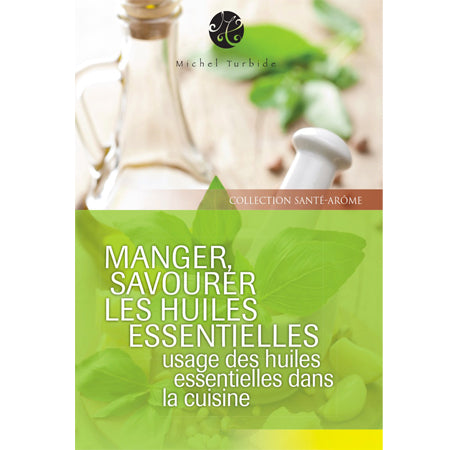Eat, savor essential oils
Eat, savor essential oils
SKU:P-FMT06
Couldn't load pickup availability
Details :
Eat, savor essential oils
Mr. Turbid
142 pages | 2016
ISBN 978-2-9812802-0-6
Essential oils in the kitchen have digestive, antispasmodic, antiseptic, calming properties, and more. The value of essential oils lies in the power to amplify the aroma of a dish. Initially, we notice the more powerful aroma.
When you taste a dish seasoned with essential oils, the olfactory pleasure comes alive and you discover its more assertive taste. You will learn to savor food with maximum pleasure.
Description :
When you season a dish with herbs, spices and a citrus zest: you are already doing aromatherapy.
All these gestures have the function of flavoring the dishes. I suspect that in ancient times, the aromatic plants chosen had other functions than adding flavor to prepared meals. They were to be used above all to protect against bacterial and parasitic infections or to aid digestion.
These gestures constituted a form of aromatherapy. The repeated use of aromatic plants meant that we could not do without the flavors of herbs thereafter. Essential oils from plants such as peppermint, anise, oregano, thyme, rosemary, clove, cinnamon, garlic and onion are in aromatherapy excellent anti-infectious essential oils or which helps digestion. To season your dishes, essential oils will seduce you with their taste and olfactory characteristics.
The value of essential oils in the kitchen lies in the power to amplify the aroma of a dish. At first, we notice its smell, its powerful aroma, then we discover the taste, more assertive. Oils provide a more complex taste than fresh or dried herbs.
When I was cooking for Le Commensal, if I had known about essential oils, I would certainly have used them. I worked there for 10 years as a cook, chef and I also did research and development (creation of new dishes).
A few drops are enough. When cooking with essential oils, start with the smallest dose and increase as needed. Essential oils being very concentrated substances, be careful with them, a single drop can be equivalent to a whole bunch of fresh herbs.
Essential oils are easier to incorporate into a recipe when they are first diluted, in a fatty substance (cream, 10% yogurt, egg yolk). They do not mix with water unless an emulsifier is used. (Alcohol, egg yolk)
Michael Turbide
He has been teaching aromatherapy since 1994 and in 2009 he started writing books on essential oils.
He studied aromatherapy with renowned people who brought a new dimension to his learning. They added a scientific dimension by describing the aromatic components. This way of looking at aromatherapy has now become the new benchmark: it is scientific aromatherapy.
He taught a lot following these trainings. Teaching allowed him to consolidate his learning. He was in contact with many therapists to whom he showed how to use essential oils in order to heal.
His books stand out for their ease of use. They are full of information including the effects of aromatic molecules, which are the causes of the therapeutic action of essential oils. His books are references for a search for well-being in complete safety.
His history :
At 16, on a spiritual quest, Michel Turbide lived and worked for two years for the Trappist monks of Oka, while completing his high school diploma. At 21, he began the practice of transcendental meditation and devoted himself to it for about ten years. During this period, he learned the basics of vegetarian cooking.
Then, a fan of healthy eating, he became a cook at Commensal for another decade. Over the years, he became chef and then manager. During this period, he completed a bachelor's degree in administration at the University of Quebec in Montreal.
Subsequently, he studied various alternative medicines: naturopathy, homeopathy and especially aromatherapy. Life gave him a huge gift: his first course in this field was offered by the famous aromatherapy researcher Pierre Franchomme. This French authority is the co-author of the book Aromatherapy Exactly , considered the ultimate reference in aromatherapy. This decisive encounter is the trigger for the now vital passion of Michel Turbide.
He is also trained by the Belgian pharmacist, aromatherapist and author, Dominique Baudoux. Michel Turbide continues his training with the author, veterinarian-researcher in aromatherapy Dr. Debauche, as well as with Luc Larivée and Maurice Nicole, also experts in the field.
Michel Turbide was a regular columnist for Vitalité Québec magazine, as well as for the online magazine infonaturel.ca. He is still today a regular collaborator-columnist since 2016 for the magazine Le Monde au Naturel.
Currently, he teaches everywhere in Quebec as well as in New Brunswick: in schools of massage therapy, naturopathy but also with people who want to learn more about essential oils. He is passionate about aromatherapy and loves sharing his knowledge. For nearly 25 years, Michel Turbide has been training and advising therapists and the French Canadian population on the proper use of essential oils.
Materials / ingredients
Materials / ingredients
Features
Features
Properties
Properties
Use
Use
Caution
Caution
Dimensions / weight
Dimensions / weight


